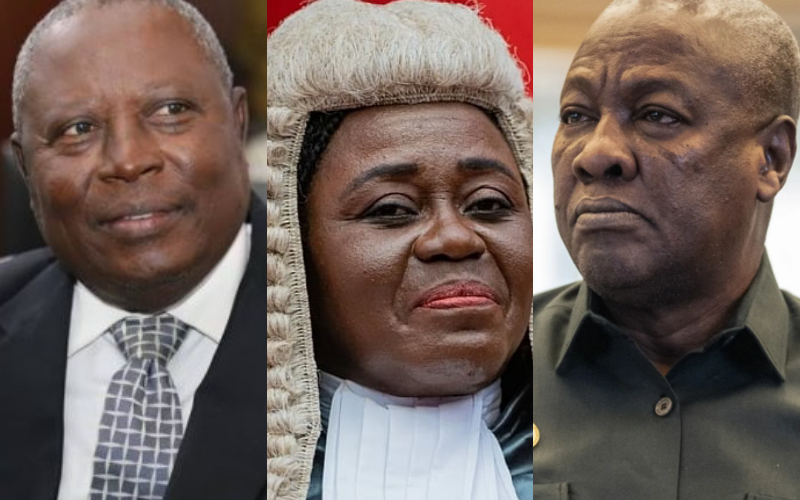Former Special Prosecutor Martin Amidu has issued a stern warning against prematurely concluding the ongoing inquiry into Chief Justice Gertrude Esaaba Torkonoo’s conduct. He argues that forcing her resignation before the committee completes its investigation and delivers its findings would set a dangerous precedent, potentially encouraging future acts of vengeance. Amidu draws parallels to a past incident involving Supreme Court Justice Kweku Etrew Amua-Sekyi, who resigned in 1998 after a prima facie case was established against him. Amidu, then Deputy Attorney General, opposed the resignation, predicting it would fuel retribution. He contends that his warnings were ignored, and Amua-Sekyi, later appointed Chairman of the National Reconciliation Commission, allegedly targeted those involved in his earlier removal process. Amidu emphasizes the importance of allowing due process to run its course, cautioning that prematurely ending the current inquiry would be akin to “releasing a wounded snake,” which could return to inflict further harm.
Amidu’s central argument revolves around the potential consequences of circumventing the established legal process. He believes that allowing the Chief Justice to resign before the committee concludes its work would not only undermine the integrity of the inquiry but also embolden individuals facing similar scrutiny in the future. He fears that such a move would signal that those in positions of power can evade accountability by simply resigning before a full investigation is conducted. This, he argues, would weaken the mechanisms designed to ensure judicial integrity and accountability, ultimately eroding public trust in the justice system. He highlights the Amua-Sekyi case as a prime example of the potential repercussions of allowing individuals to escape full scrutiny, alleging that Amua-Sekyi used his subsequent position to exact revenge on those who had initiated proceedings against him.
The core of Amidu’s analogy of a “wounded snake” lies in the potential for future harm if the current inquiry is prematurely terminated. He believes that allowing the Chief Justice to resign before the committee delivers its findings would be equivalent to leaving a dangerous situation unresolved. Just as a wounded snake might recover and strike again, he suggests that allowing the Chief Justice to step down without a full investigation and appropriate sanctions, if warranted, could enable her to return to a position of influence and potentially inflict further damage on those who brought the petitions against her. He stresses that allowing due process to unfold fully is crucial to neutralizing any potential threat and ensuring that justice is served.
Amidu’s strong opposition to the calls for the Chief Justice’s resignation stems from his conviction that due process must be followed meticulously. He argues that allowing the established legal procedures to run their course is essential for maintaining the integrity of the judicial system and safeguarding public trust. He criticizes the pressure for the Chief Justice to resign, viewing it as an attempt to circumvent the formal inquiry process and potentially shield her from full accountability. He emphasizes the importance of allowing the committee to complete its investigation, gather all relevant evidence, and reach a well-informed conclusion based on the facts presented. He maintains that only through a comprehensive and impartial inquiry can the truth be ascertained and appropriate action taken, if necessary.
Drawing a direct connection between the Amua-Sekyi case and the current situation, Amidu warns that history might repeat itself if the Chief Justice is allowed to resign before the committee completes its work. He contends that Amua-Sekyi’s alleged acts of vengeance demonstrate the potential dangers of allowing individuals to evade full accountability by resigning prematurely. He fears that a similar scenario could unfold if the Chief Justice is allowed to step down before the inquiry is concluded, potentially enabling her to retaliate against the petitioners in the future. He urges President Mahama to resist any pressure to accept the Chief Justice’s resignation while the investigation is ongoing, emphasizing the importance of upholding the rule of law and ensuring that due process is followed to its logical conclusion.
Amidu’s concluding remarks underscore his belief that allowing the Chief Justice to resign before the committee delivers its findings would be a grave mistake, potentially leading to further harm and undermining the principles of justice and accountability. He reiterates his warning against “releasing a wounded snake,” emphasizing the potential for future repercussions if the inquiry is prematurely terminated. He urges the President to uphold his constitutional duty and allow the committee to complete its work unimpeded, ensuring that the process is transparent, fair, and adheres to the principles of due process. He emphasizes that only through a thorough investigation and appropriate action, if warranted, can public trust in the judiciary be maintained and the integrity of the legal system be preserved.


